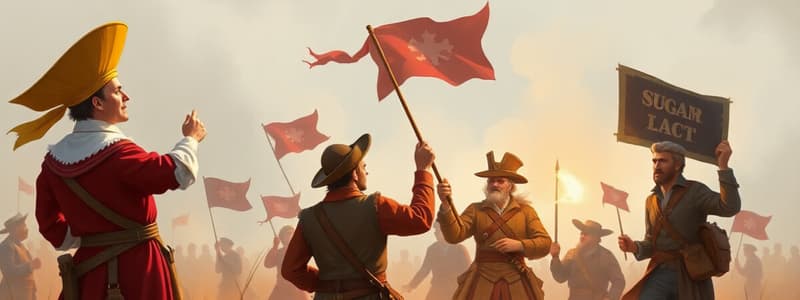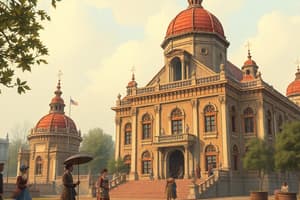Podcast
Questions and Answers
What was the main purpose of the Sugar Act?
What was the main purpose of the Sugar Act?
- To limit trade between the colonies
- To raise money for Britain after the French and Indian War (correct)
- To punish colonists for smuggling
- To increase the price of British goods
How did many colonists respond to the Sugar Act?
How did many colonists respond to the Sugar Act?
- By smuggling goods to avoid the tax (correct)
- By sending petitions to King George III
- By boycotting all imported goods
- By accepting it without protest
What did the Stamp Act require colonists to do?
What did the Stamp Act require colonists to do?
- House British soldiers in their homes
- Stop smuggling goods from other countries
- Purchase stamped paper for documents and printed items (correct)
- Pay taxes on all imports
How did the colonists successfully protest the Stamp Act?
How did the colonists successfully protest the Stamp Act?
Which items were taxed under the Townshend Acts?
Which items were taxed under the Townshend Acts?
What role did the Daughters of Liberty play in protesting the Townshend Acts?
What role did the Daughters of Liberty play in protesting the Townshend Acts?
What happened during the Boston Massacre?
What happened during the Boston Massacre?
How did Paul Revere's engraving of the Boston Massacre influence public opinion?
How did Paul Revere's engraving of the Boston Massacre influence public opinion?
Why did the Tea Act anger colonists?
Why did the Tea Act anger colonists?
What was the result of the Tea Act in Boston?
What was the result of the Tea Act in Boston?
What was one of the Intolerable Acts?
What was one of the Intolerable Acts?
How did the colonies respond to the Intolerable Acts?
How did the colonies respond to the Intolerable Acts?
What did the First Continental Congress accomplish?
What did the First Continental Congress accomplish?
Why was the First Continental Congress significant?
Why was the First Continental Congress significant?
What was the purpose of the Olive Branch Petition?
What was the purpose of the Olive Branch Petition?
How did King George III respond to the Olive Branch Petition?
How did King George III respond to the Olive Branch Petition?
What was the British goal at Concord?
What was the British goal at Concord?
What happened after the fighting at Lexington and Concord?
What happened after the fighting at Lexington and Concord?
Flashcards
Sugar Act (1764)
Sugar Act (1764)
A law passed by the British Parliament in 1764 that taxed sugar, molasses, and other goods imported into the American colonies. It was designed to raise revenue for Britain after the French and Indian War.
No taxation without representation
No taxation without representation
The colonists' slogan in response to the Sugar Act, protesting that they were being taxed without having any representation in the British Parliament.
Stamp Act (1765)
Stamp Act (1765)
The first direct tax imposed on the American colonists by the British Parliament in 1765. It required colonists to buy special stamped paper for various documents and printed items.
Sons of Liberty
Sons of Liberty
Signup and view all the flashcards
Boycott
Boycott
Signup and view all the flashcards
Declaratory Act (1766)
Declaratory Act (1766)
Signup and view all the flashcards
Townshend Acts (1767)
Townshend Acts (1767)
Signup and view all the flashcards
Daughters of Liberty
Daughters of Liberty
Signup and view all the flashcards
Boston Massacre (1770)
Boston Massacre (1770)
Signup and view all the flashcards
Paul Revere's engraving of the Boston Massacre
Paul Revere's engraving of the Boston Massacre
Signup and view all the flashcards
Tea Act (1773)
Tea Act (1773)
Signup and view all the flashcards
Boston Tea Party
Boston Tea Party
Signup and view all the flashcards
Intolerable Acts (1774)
Intolerable Acts (1774)
Signup and view all the flashcards
First Continental Congress (1774)
First Continental Congress (1774)
Signup and view all the flashcards
Olive Branch Petition (1775)
Olive Branch Petition (1775)
Signup and view all the flashcards
Battles of Lexington and Concord (1775)
Battles of Lexington and Concord (1775)
Signup and view all the flashcards
Minutemen
Minutemen
Signup and view all the flashcards
The Shot Heard Round the World
The Shot Heard Round the World
Signup and view all the flashcards
Study Notes
The Sugar Act (1764)
- Britain, after the French and Indian War, imposed the Sugar Act to raise revenue from the colonies.
- The act taxed sugar, molasses, and other imported goods.
- Colonists opposed the tax, protesting that they had no representation in Parliament.
- Smuggling became widespread as merchants evaded the tax.
- Colonial assemblies protested to Parliament.
The Stamp Act (1765)
- The Stamp Act was a direct tax on colonists.
- It required colonists to purchase special stamped paper for documents, newspapers, playing cards, and more.
- Colonists strongly resisted the Stamp Act, forming groups like the Sons of Liberty.
- Protests and intimidation of tax collectors were widespread.
- The Stamp Act was eventually repealed in 1766.
- The Declaratory Act was passed, asserting Parliament's right to make laws for the colonies.
The Townshend Acts (1767)
- The Townshend Acts taxed everyday items like glass, paper, paint, and tea.
- Colonists organized boycotts of British goods in response.
- Women, often called the Daughters of Liberty, played a significant role in the boycotts by producing homemade goods.
- These acts led to increased tension between British soldiers and colonists.
The Boston Massacre (1770)
- Tensions between British soldiers and colonists escalated in Boston.
- A confrontation occurred on March 5, 1770, resulting in the death of five colonists.
- Crispus Attucks, a man of African and Native American descent, was among those killed.
- The event became a rallying cry for colonial resistance.
The Tea Act (1773)
- The Tea Act allowed the British East India Company to sell tea directly to the colonies at a lower price, bypassing colonial merchants.
- This was done to support the struggling company.
- Despite the lower price, the principle of "no taxation without representation" was still violated for many.
- Colonists responded by dumping tea into Boston Harbor in the Boston Tea Party in December 1773.
The Intolerable Acts (1774)
- The Intolerable Acts, also known as the Coercive Acts, were a set of laws passed by Parliament in response to the Boston Tea Party.
- These acts punished the colonists, including closing Boston Harbor, restricting town meetings, and quartering British troops in colonial homes.
- The acts fuelled colonial unity against British policies.
The First Continental Congress (1774)
- Colonial leaders met in Philadelphia to coordinate their response to the Intolerable Acts.
- The Congress adopted a course of action that called for boycotts of British goods.
- The Congress emphasized colonial grievances to the King.
- It represented an early step toward collective action by colonies against British policies.
The Olive Branch Petition (1775)
- The Olive Branch Petition was sent to King George III by the Second Continental Congress.
- The petition attempted to avoid war by reaffirming loyalty to the British crown while requesting redress of grievances.
- King George III rejected the petition, leading many colonists toward favoring independence.
The Battles of Lexington and Concord (1775)
- British troops marched to seize colonial weapons and arrest leaders like Samuel Adams.
- A confrontation occurred in Lexington, resulting in the first shots of the American Revolution.
- The British were forced to retreat from Concord, marking the beginning of armed conflict.
Studying That Suits You
Use AI to generate personalized quizzes and flashcards to suit your learning preferences.




